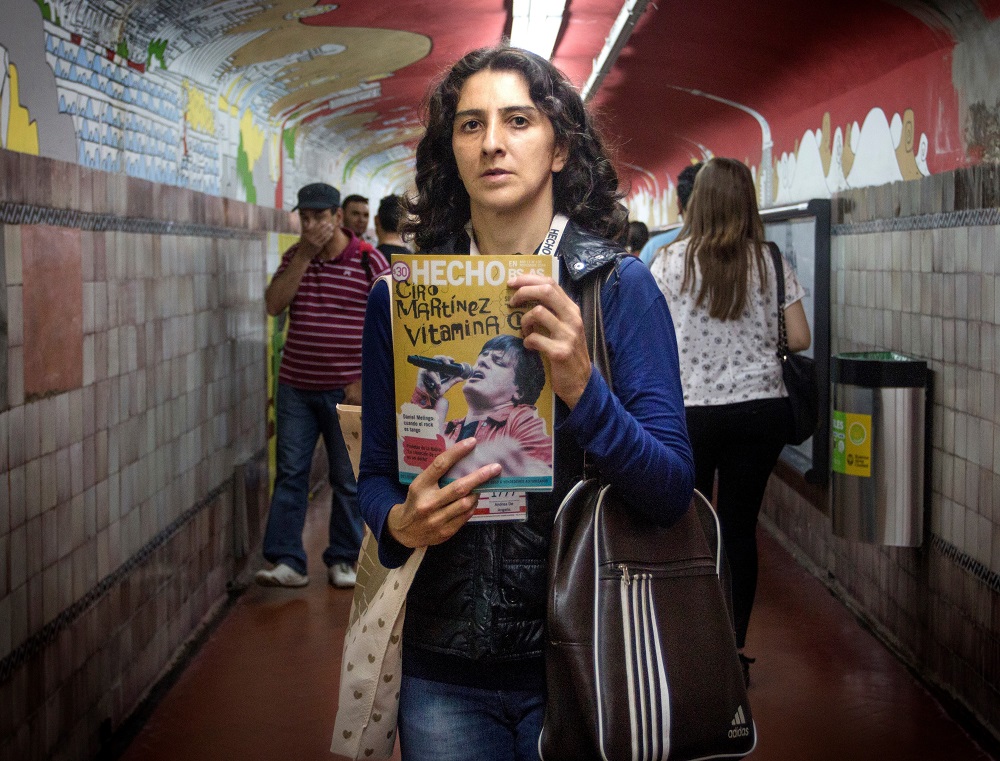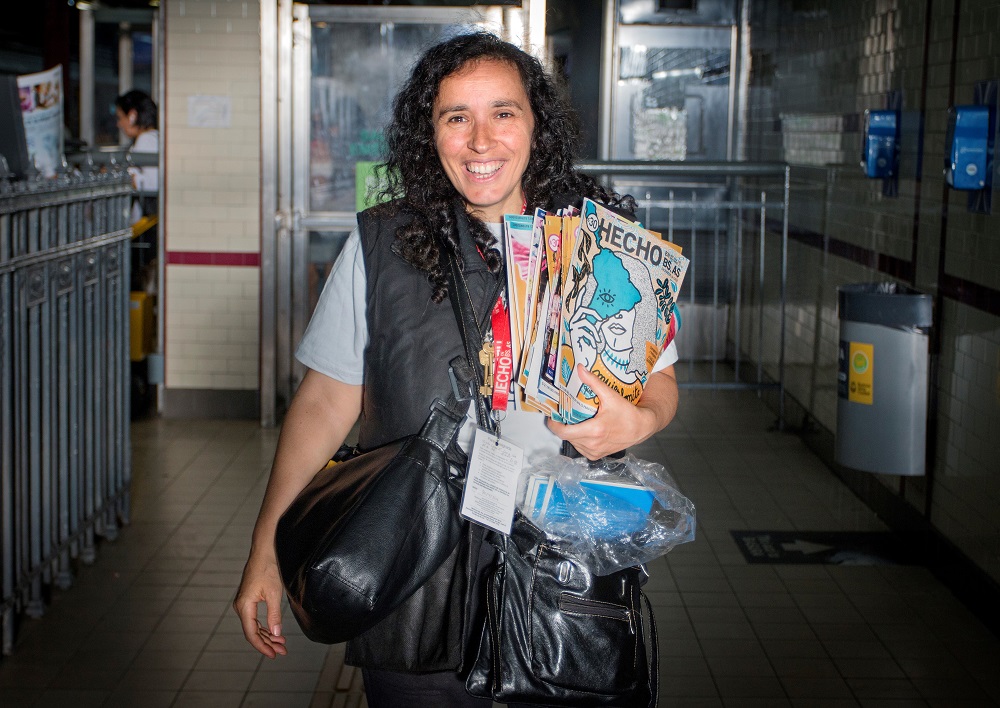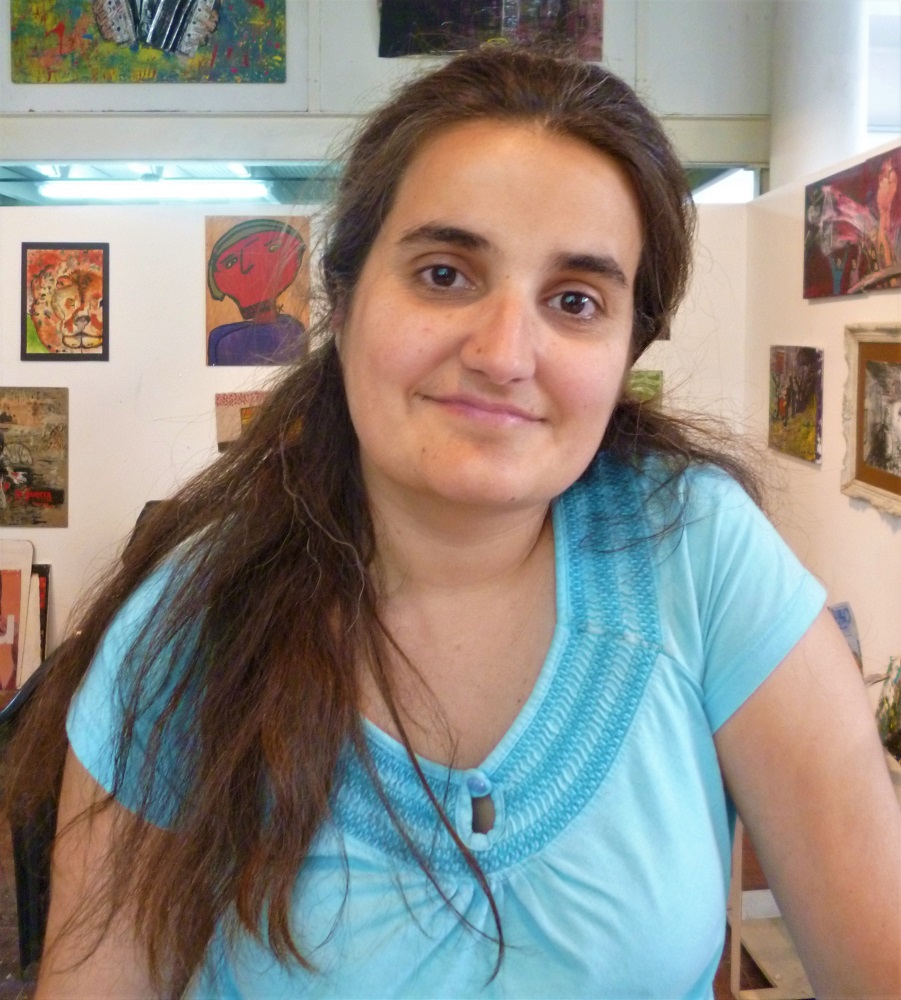By Vale Cantor, Hecho en Bs. As.
Andrea de Angelis: “My son is a miracle of nature”
Andrea has been selling Hecho en Bs As for twelve years from her pitch on the D line in Puerreydón station. She lives in the Constitución neighbourhood with her son, who she raised alone.
“I started working as a Hecho en Bs As vendor during a terrible time in my life,” she says. “I was all alone with my son, who was still a baby: he still couldn’t walk, and I was desperate. Back then, I was living in a women’s shelter, but I had to leave as there were a lot of problems there with abuse and things like that…”. Andrea looks down, her gaze resilient, and her voice soft but commanding.
Andrea was left with nothing following the death of her parents and poor financial management by one of her brothers. That is how she ended up on the street, pregnant by a man who had left her. She had her son Ezequiel in the Hospital de Clínicas, and her intuition told her to ask for help there. “My son is a miracle of nature, because I spent my whole pregnancy on the street,” she says. “I was hungry, and all sorts of things happened to me.”

She recalls that the first time she heard her baby’s heartbeat was when the clinic ran some tests on her. “They tested everything: I was hypertensive and anaemic, and I had a urine infection. Still, my son was born without any problems. The doctors, nurses and the bosses were all amazing. I told them about my situation, I told them everything, and it was great. I always think that, if all of this hadn’t happened to me, I wouldn’t have my son now – and he is the most wonderful thing in the world. Without the strength he gives me, I don’t know what would have become of me.”
One day, she was walking down Congreso with her baby when she saw a Hecho en Bs As vendor. “I asked what I had to do to register as a vendor and that’s how I got started with the magazine,” she remembers.
Andrea’s first pitch was on Av Santa Fé y Gallo. “There was nothing I could do but take my baby with me while I worked. I stood at my pitch with my son in one arm and the magazine in the other, and that’s how I started out,” she recalls. “People bought the magazine from me, and I started to sell a lot of copies. Now that my son has started to manage on his own and I want to finish high school, I have to organise my hours differently. I’m used to working in the street, so I’ve seen a lot of things… that’s why I’m in the subway, always in the same passageway, so people know me now. There are readers who always buy from me, every month,” Andrea smiles. “I’m doing well selling the magazine: there’s nothing else I’d rather be doing. It gives me my independence. Thanks to Hecho en Bs As, everything is turning out fine.”
Claudia Santoro, alias Selene Babel:“We are slaves of the system”
Selene has brown hair, a penetrating gaze, and a powerful and firm voice.
“I had always sold HBA as a product, as what it is; then, I tried to elevate the magazine and, in doing so, I tried to elevate myself,” she says.
Before becoming a vendor, Selene was working as a carer for an elderly man, and it was her last month doing so. One day, she bought the magazine on the D line of the subway, asked the vendor how to register with HBA and did so the next day. “I was a bad saleswoman: I had tried to sell and I hadn’t been able to. I was going to Biodanza and I mentioned there that it was my last month of permanent work and I couldn’t dance because it was worrying me. I felt like I wasn’t going to be able to support myself. Then we did the dance of growth, to help me,” Selene recalls. “So, I started selling HBA, at a pitch in Abasto at first.
“One day at HBA, I mentioned that I didn’t know how to sell the magazine and I went with the vendor who had brought me, José María, to line A of the subway. The first day that José left me alone, I didn’t know what to say.” But Selene is brave, and she will take on anything. She took deep breaths, in and out. “After a while, I got over it and sold 19 magazines, which was a lot for me; then I started to sell 25 a day, then 40, then 50, until I was selling 70 a day. When they asked me to go to Puerto Madryn, I managed to sell more.”

Selene talks about her ego and says that she is not able to overcome it. “The ego, that which we know as ‘I’, is adapted; we are educated by scientific, economic, religious and political powers. They all lie to you and that makes us slaves of the system. You feed the slavery, because you already have this order inside you, and it limits you because we allow ourselves to be limited. And I overcame this with my ego, because it’s not a question of belief, because we have to see how we overcome this to create our true self, what I call the ‘Adapted Ego’. The true self is in contact with the unknown. I believe that this is the way that we can transcend the system.”
What is it like working in the subway? “Those who sell other things don’t respect me, they come up and take over the subway. It’s because I’m a woman; if I was a guy, they wouldn’t do it,” she says. “And yes, I react in different ways: sometimes I get angry and sometimes I don’t, sometimes I make deals with the musicians. I take refuge in the people who smile at me, who look at me with kindness, because there are people who look at you with disdain. By focussing on kindness, I don’t notice the disdainful people.”
Selene has written and edited her own book. “The book is about rhymes, about names, but the leitmotif is the same: it’s about nature and human beings,” she explains. “I want to be a writer, and what I would like to do most is travel. Right now, I’m saving for a passport. I want to travel across Latin America and then to Australia and Africa. The magazine has improved my life. To change my life, I had to change myself,” Selene says.
“I am still doing Biodanza. I also studied stand-up, I studied to be a clown, I travelled to Cordoba, Mar del Plata, Puerto Madryn and Cataratas. Thanks to the magazine, I’ve rented a studio apartment, written a book, travelled, and I do yoga,” she says. “I flew to Puerto Iguazú. It was the first time I had been on a plane – all with money from the magazine! In 2014, I bought myself a bike and a tent, both second-hand, to go to Cordoba. But it’s not the same now. People don’t have money.”
Vicky Merino: “In Hecho there is a love that I never saw in any work”
As Serrat would say, Vicky Merino is thin like a breeze, has brown hair and there is an air about her that is somewhere between tenderness and sadness.
“I have always liked to sing,” she says. “I started singing in a gospel choir, and I’ve been singing gospel for years. I’ve been in a number of choirs and now I’m in one which is organised by a Christian group, because there was no real spiritual search in the one I was going to before. We prayed before we sang in the rehearsals, but… in reality, I was going there for something else, to spread the message of Jesus so that hearts would be affected by his message.”
Vicky is like a child with her fixed smile, and her happy and always open nature. She started selling HBA a few years ago and her pitch is at the Hospital Centrángolo de Vicente López. “After buying myself a potter’s wheel, I worked as an artisan, but I wasn’t doing well,” she says, thinking back to the circumstances that led to her becoming a vendor. “I met a guy who worked for the magazine, and he suggested that I start selling it alongside my craftwork, and so I did. I remember it well: the September 2015 issue was the first one I sold. Diego Capusotto was on the cover.”

She tells tales of twisted and long-suffering relationships, of partners who have cheated on her, and so on. “I had been deceived in a relationship. I was furious with men really, very sad and angry because I had been cheated on. Those feelings came from my first love, and my last boyfriend was a real womaniser. He abused me psychologically,” she confides. But Vicky could not put up with his temper. “I sent him a message, as God looked after me and told me to forgive him… and considering everything I found out later, it’s just as well that we split up!” she says, with an infectious laugh.
Vicky’s pitch is at the Hospital Centrángolo in Florida, and she says that working in the street is not a problem for her. “Because I’m with the people coming and going from the hospital so much, I sell them the magazine and I also talk to them about the word of God, if they are happy to do so, obviously,” she tells me. “If it doesn’t interest them, I don’t talk to them about it and I just sell them the magazine. I also feel protected by Jesus and by the magazine.”
Vivacious, and always with some witticism up her sleeve, Vicky is a woman who is happy in herself and in what she does. She participates in HBA’s art workshops and what she likes most about HBA is that it makes vendors more sensitive as individuals. She also feels that selling the magazine is more than just a job to earn money. “HBA encourages you, both with the notes and the workshops they offer. They are a great blessing,” she says. “I’m very happy to be here, I love being able to sell HBA and I love the atmosphere there. It’s a love I’ve never experienced in any other job and I feel very loved.”
With a kiss and a big hug, she bids us farewell, with a “God bless you” in her smile.
Translated from Spanish by Louisa Devine




















